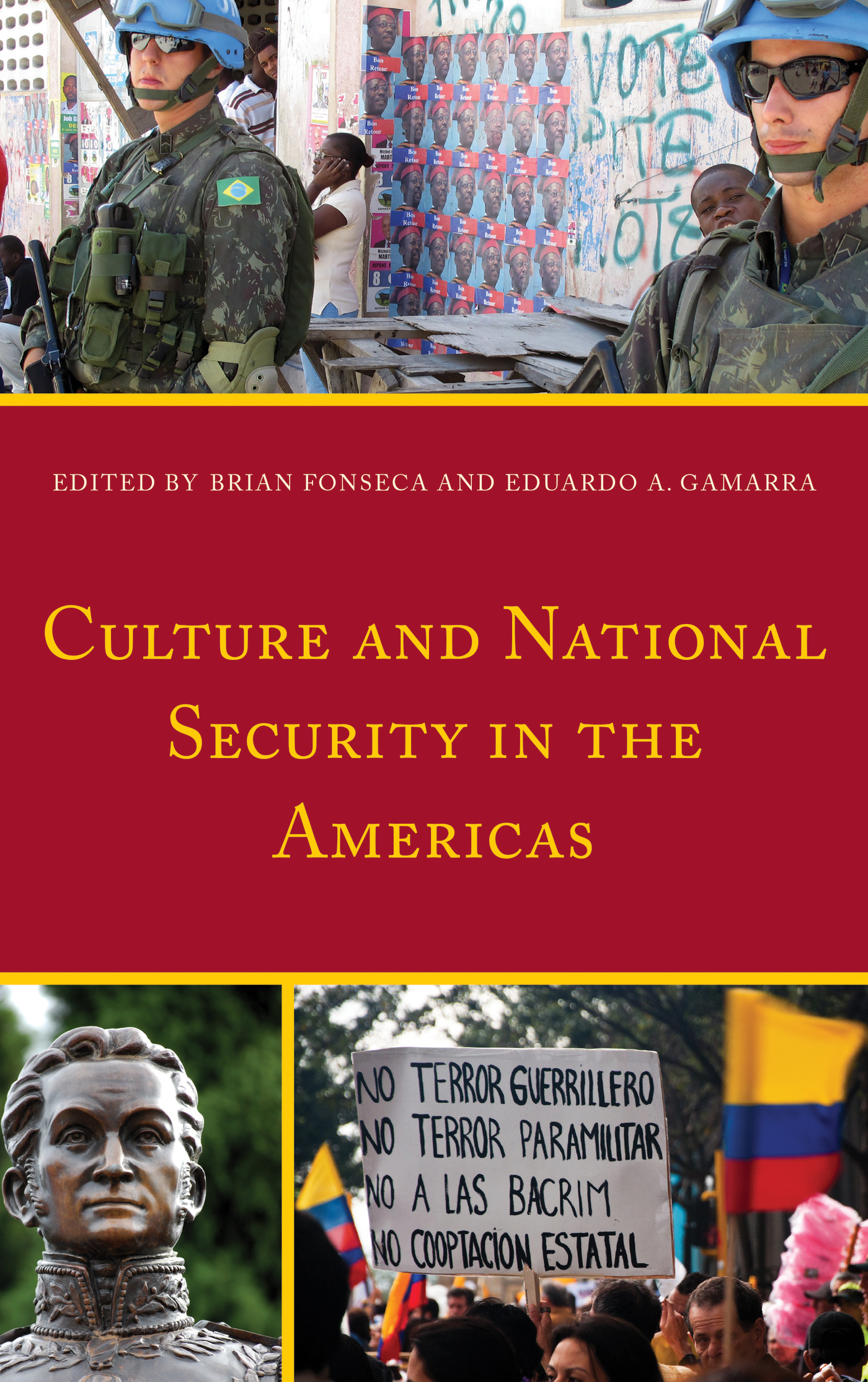Culture and National
Security in the Americas
Security in the Americas in the
Twenty-First Century
Series Editor: Jonathan D. Rosen
Countries throughout the Americas face many challenges in the twenty-first century such as drug trafficking, organized crime, environmental degradation, guerrilla movements, and terrorism among many other major threats. In this series, titled Security in the Americas in the Twenty-First Century, we invite contributions on topics focusing on security issues in specific countries or regions within the Americas. We are interested in approaching this topic from a political science and international relations perspective. However, we invite manuscript submissions from other disciplines. The aim of this series is to highlight the major security challenges in the twenty-first century and contribute to the security studies literature. We invite both policy-oriented and theoretical submissions.
Recent Titles
Cooperation and Drug Policies in the Americas: Trends in the Twenty-First Century, edited by Roberto Zepeda and Jonathan D. Rosen
Reconceptualizing Security in the Americas in the Twenty-First Century, edited by Bruce M. Bagley, Jonathan D. Rosen, and Hanna S. Kassab
Prisons in the Americas in the Twenty-First Century: Human Dumping Ground, edited by Jonathan D. Rosen and Marten W. Brienen
Decline of the U.S. Hegemony?: A Challenge of ALBA and a New Latin American Integration of the Twenty-First Century, edited by Bruce M. Bagley and Magdalena Defort
Colombias Political Economy at the Outset of the Twenty-First Century: From Uribe to Santos and Beyond, edited by Bruce M. Bagley and Jonathan D. Rosen
The Obama Doctrine in the Americas, edited by Hanna S. Kassab and Jonathan D. Rosen
Linking Political Violence and Crime in Latin America: Myths, Realities, and Complexities, edited by Kirsten Howarth and Jenny H. Peterson
Organized Crime, Drug Trafficking, and Violence in Mexico: The Transition from Felipe Caldern to Enrique Pea Nieto (20062015), by Jonathan D. Rosen and Roberto Zepeda
U.S.-Cuba Relations: Charting a New Path, by Jonathan D. Rosen and Hanna S. Kassab
Fragile States in the Americas, edited by Jonathan D. Rosen and Hanna S. Kassab
Culture and National Security in the Americas, edited by Brian Fonseca and Eduardo A. Gamarra
Culture and National
Security in the Americas
Edited by
Brian Fonseca
Eduardo A. Gamarra
LEXINGTON BOOKS
Lanham Boulder New York London
Published by Lexington Books
An imprint of The Rowman & Littlefield Publishing Group, Inc.
4501 Forbes Boulevard, Suite 200, Lanham, Maryland 20706
www.rowman.com
Unit A, Whitacre Mews, 26-34 Stannary Street, London SE11 4AB
Copyright 2017 by Lexington Books
All rights reserved. No part of this book may be reproduced in any form or by any electronic or mechanical means, including information storage and retrieval systems, without written permission from the publisher, except by a reviewer who may quote passages in a review.
British Library Cataloguing in Publication Information Available
Library of Congress Cataloging-in-Publication Data
Names: Fonseca, Brian, 1976- editor of compilation. | Gamarra, Eduardo, editor of compilation.
Title: Culture and national security in the Americas / edited by Brian Fonseca, Eduardo A. Gamarra.
Description: Lanham, MD : Lexington Books, [2017] | Series: Security in the Americas in the twenty-first century | Includes bibliographical references and index.
Identifiers: LCCN 2016047268 (print) | LCCN 2016057205 (ebook) | ISBN 9781498519588 (cloth : alk. paper) | ISBN 9781498519595 (electronic)
Subjects: LCSH: National securityLatin America. | Strategic cultureLatin America. | Latin AmericaPolitics and government21st century.
Classification: LCC UA602.3 .C85 2017 (print) | LCC UA602.3 (ebook) | DDC 355/.03308dc23
LC record available at https://lccn.loc.gov/2016047268
 TM The paper used in this publication meets the minimum requirements of American National Standard for Information Sciences Permanence of Paper for Printed Library Materials, ANSI/NISO Z39.48-1992.
TM The paper used in this publication meets the minimum requirements of American National Standard for Information Sciences Permanence of Paper for Printed Library Materials, ANSI/NISO Z39.48-1992.
Printed in the United States of America
In memory of Moises Caballero, Gerard LeChevalier, and my father, Ronald Fonseca.
Foreword
International relations scholars, foreign policy analysts, and U.S. government planners frequently focus too much importance on traditional sources of power in shaping national security interests throughout Latin America and the Caribbean, while not giving sufficient attention to more non-traditional variables such as culture. In fact, culture is critical, if not fundamental, in understanding how security policy in the region is formed. To that end, Brian Fonseca and Eduardo A. Gamarra have assembled a superb group of scholars and practitioners to explore the intersection of culture and national security in the Americas, filling a void in the literature on this vastly importantand often understudiedsubject.
This text provides a strong analytic approach that is largely grounded in the concept of strategic culture. The analytic approach is applied to twelve countries throughout Latin America and the Caribbean. The overall objective of this work is to understand the software that informs national security policy in the Americas. The authors in this book are leaders in the discipline. While some of the individuals are academicians, others have worked in government and have vast policy experience. The participants have diverse, multidisciplinary academic backgrounds from history, geography, political science, and sociologyamong other fields. In addition to the academic diversity, the contributors come from throughout the hemisphere, offering a broad set of perspectives often not seen in these kinds of volumes.
Culture and National Security in the Americas is part of an ongoing effort to bridge the divide between academia and the policy community. Sound, scientific, and rigorous academic research is essential in informing decision-makers who must address the litany of complicated problems, in an environment that is increasingly becoming more complicated and diffused. Thus, this text is not only useful for academics, students, and foreign policy analysts, but it can truly support policymakers understanding of the deeper, more salient currents effecting the security orientation and national security policy formation of countries of the Americas.
As a former Deputy Assistant Secretary of Defense for the Western Hemisphere under President Obama, it is my honor and privilege to endorse this work, and I hope that it leads to fruitful debates and exchanges between academicians, policy analysts, practitioners, and students. More importantly, I hope that it leads to a better understanding of the overall security environment in a way that promotes peace in the Americas.
Frank O. Mora, PhD
Director, Kimberly Green Latin American and Caribbean Center
Steven J. Green School of International and Public Affairs
Florida International University
Preface
Brian Fonseca and Eduardo A. Gamarra
Culture and National Security in the Americas is a humble attempt to examine the principal considerations that shape and inform national security policy across Latin America and the Caribbean. Enlisting the brightest minds from around the Western Hemisphere, the editors objective is to map the most important historical, geographic, cultural, political, economic, and security characteristics of the national security orientations of the nations of this hemisphere.

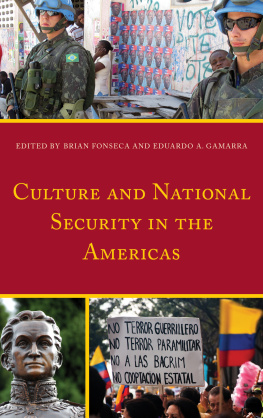

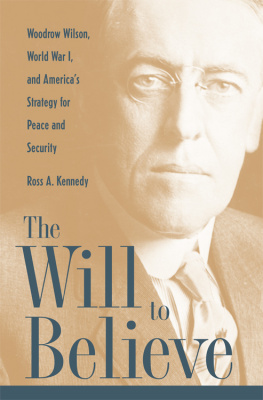

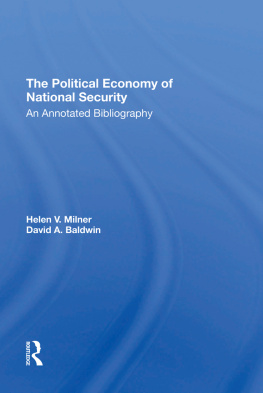
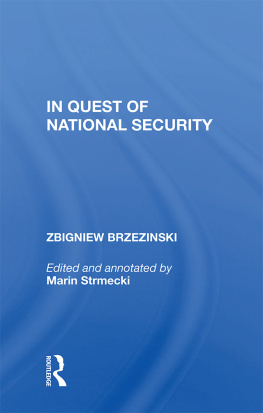
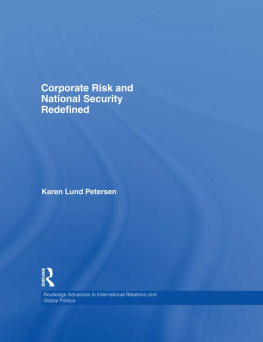
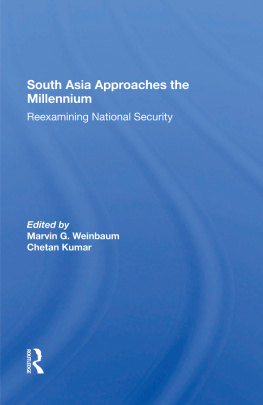
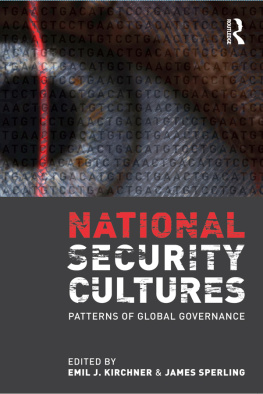



 TM The paper used in this publication meets the minimum requirements of American National Standard for Information Sciences Permanence of Paper for Printed Library Materials, ANSI/NISO Z39.48-1992.
TM The paper used in this publication meets the minimum requirements of American National Standard for Information Sciences Permanence of Paper for Printed Library Materials, ANSI/NISO Z39.48-1992.